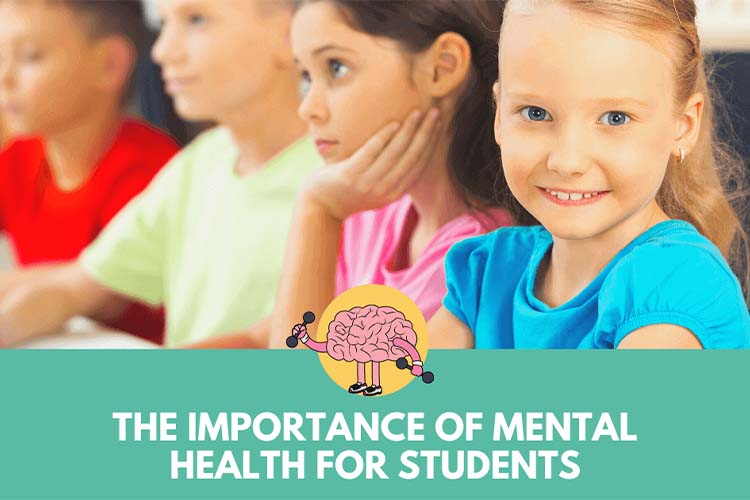

What is Mental Health?
Mental health includes our physical, emotional and social well-being. It affects how we think, feel, and act. It also helps determine how we deal with stress and make choices. Mental health is important at every stage of life, from childhood and adolescence through adulthood.
The importance of positive mental health cannot be overstated. It is no less important than physical health in living a happy, fulfilling life. Many factors can contribute to the deterioration of one’s mental health including, but not limited to, the following:
One’s mental health can also deteriorate over time, which usually occurs when the demands placed on one are greater than they have the capacity to handle.
For example, if someone is working long hours, caring for an ill relative, experiencing economic hardship, or struggling with schoolwork, they may experience poor mental health.
Read more on mental health here.
Mental Health of Students
Having poor mental health can adversely impact many aspects of a student’s life, such as reducing their quality of life, academic achievement, physical health, and satisfaction with the learning experience, and negatively impacting relationships with friends and family members.
These issues can also have long-term consequences for students, affecting their future employment, earning potential, and overall health. Due to the many stresses of student life, many students report suffering from mental health issues such as depression, anxiety, sleep difficulties, eating disorders, with many even contemplating or committing suicide.
For many years the topic of mental health has been taboo, with mental health difficulties still considered a weakness in some cultures. Cultural and familial pressures can keep many students from sharing their mental health struggles.
Fear of negative reactions from family and friends is the leading cause of many students’ mental health problems going undiagnosed. However, this societal mindset needs to change if we are to see any change for the better.
If students are educated about these issues, it could help them identify any possible symptoms in themselves, and help them feel more comfortable asking for help. The root of the problem is that many consider the symptoms to be normal.
Irritability, feeling constantly tired or on edge, headaches mood swings or insomnia are common signs that something wrong is going on and cannot be ignored. It can help realize that many people among us might be suffering from similar issues.
Opening up to a friend, someone from your family, or even consulting an online forum can be a source of great relief to someone who’s suffering.
Educating students about mental health at a young age not only helps make diagnosing any issues they themselves might have, it also makes it more likely that they will adopt values of not considering mental health shameful, and will be more accepting and helpful towards people who have these issues.
Consequences
Leaving mental health problems can have a whole host of negative consequences for students, such as poor grades, bad discipline, suspension, expulsion, and even suicide.
School struggles due to mental health problems can follow a student throughout their entire lives. They may have the same issues in the workplace, and those that face expulsion or drop out, their quality of life greatly suffers.
A symptom of depression, one of the most common mental illnesses, is general disinterest. This disinterest in life can lead to students missing out on many important experiences, not pursuing passions, or not even discovering passions or talents in the first place.
Disinterest can also lead to poor academic performance, with students struggling to engage with the coursework, or losing interest in attending classes in the first place.
When someone is experiencing anxiety or depression the majority of their mental capacity is used to create and process worrisome thoughts. This can lead to them struggling with schoolwork, falling behind, and generally being exhausted, as these constant thoughts can be very tiring. These disorders also lead to poor memory, making academic work even harder.
Students with these problems often struggle to connect with their peers, perceiving social situations as dangerous, or uncomfortable, leading to them developing poor to no social skills. This self-isolation can also make those around them uncomfortable, leading to even further isolation.
Physical symptoms like headache, fatigue, nausea and unexplained illness are also risks of untreated anxiety and depression. Children with these disorders have a higher resting heart rate, higher blood pressure, higher cortisol levels and they carry more tension in the body. These physical effects often lead to missed school days causing the child to fall behind.
Dealing with mental disorders can often lead to students feeling that they are missing out on things their peers are enjoying, or missing opportunities they might have wanted. These feelings can lead to further problems such as substance abuse, discipline problems, and even suicide.
We hope the content of this article effectively illustrates why we, as a society, need to be better at helping students, and even adults, struggling with mental health. Too many lives are either lost or destroyed due to this completely preventable problem, and we need to be better at intervening before it’s too late to help.
For help finding digital mental health resources, please check out:
https://socialworklicensemap.com/social-work-resources/mental-health-resources-list/